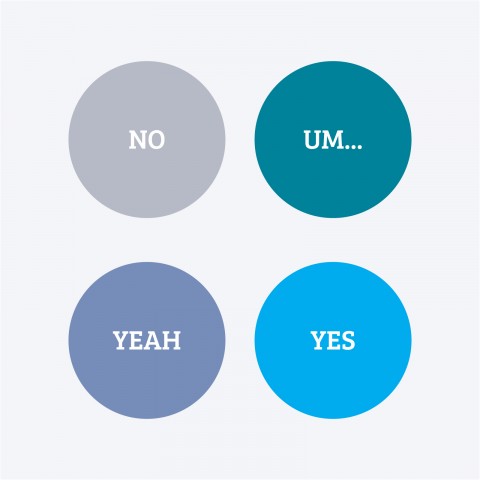
Speakers of all languages use filler words, even if they don’t realize it. Language purists hate them and sometimes they’re frowned upon, yet they persist despite these criticisms.
Polish filler words are used in various situations. They can differ depending on what region the speaker is from or even how old they are. Due to their popularity, filler words are an essential component of the language that Polish learners should study to improve their speaking and comprehension skills.
 Table of Contents
Table of Contents
- Filler Words: Why People Use Them
- The Top Polish Fillers
- Filler Words in Polish: Pros and Cons
- Final Thoughts
1. Filler Words: Why People Use Them

Fillers are words or sounds that people use to let the other party know that they haven’t finished speaking yet. The primary use of filler words, then, is to buy the speaker some time. However, there are also other reasons why people use them. Here’s a breakdown of the main purposes fillers have in speech:
- To buy time while the speaker thinks of what to say or looks for the right word
- To agree with the other party
- To show relationship between words, such as contrast or conclusion
Note that while prepositions can also perform that final function, filler words do so in a very gentle way. This makes it difficult to explain their exact meaning to others.
And of course, many people use fillers only as a mannerism. This means that the speaker uses them out of habit and the words really have no meaning.
2. The Top Polish Fillers
Now that you have a better idea of what Polish filler words are and how they’re used, let’s take a look at the most frequently used fillers. We’ll provide examples for each one so that you can see how they might appear in a conversation.
Let me think about that: Hmmm and Ummm
These fillers are similar to their English equivalents. People use them to show that they’re thinking about something or to express uncertainty:
A: Czy to on ci to powiedział? (“Did he tell you that?”)
B: Ummm… nie pamiętam dokładnie. (“Ummm… I don’t remember exactly.”)
A: Myślisz, że się wyrobimy na czas? (“Do you think we’ll make it on time?”)
B: Hmmm… mam nadzieję, że tak. (“Hmmm… I hope so.”)
Would you know how to ask other questions in Polish if you were chatting with a native speaker? Here are 10 questions you should know to get started.
The famous Polish No
In English, “no” is used for negation. In Polish, however, it’s a word close in meaning to “well.” This is probably the most abused filler in the Polish language. It can be used to express agreement or disagreement, to strengthen what you’re saying, or to give you some time. It’s often used with other words:
- No nie! (“Oh no!”)
- No tak. (“Well, yes.”)
- No nie wiem, co mam Ci powiedzieć. (“I don’t know what to tell you.”)

That last sentence would be translated the same way whether the speaker had used no or not. This is why learning how to use Polish filler words well requires a lot of exposure to both the spoken and the written language.
A: To okropne, co on zrobił! (“It’s horrible what he’s done.”)
B: Nooo. (“Yeah.”)
When used to express agreement, no is often prolonged in an exaggerated manner, like in the last example.
Saying “You know,” in Polish
Polish has an exact equivalent for the often used English filler “you know.” It’s no wiesz. Another similar filler word is Wiesz? (“You know?”) with an interrogative intonation.
- To nie ma sensu. No wiesz, co mam na myśli. (“It doesn’t make any sense. You know what I mean.”)
- No jak to się nazywa? No wiesz, o czym mówię. (“What’s the name of this thing? You know what I’m talking about.”)
- Nawet bym się z nim zgodził, wiesz? (“I’d even agree with him, you know?”)
- Ona ma cztery koty, wiesz? (“She has four cats, you know?”)
These two filler words in Polish can be used interchangeably in most situations. There’s a slight difference between them, in that no wiesz suggests the speaker is looking for understanding, while Wiesz? is used when the speaker assumes that the other person doesn’t know already (hence, the speaker is telling them).
Speaking of knowing, did you know learning Polish is considered a sport sometimes?
Exactly the right word: Właśnie

The next expression on our list of Polish filler words is właśnie. It means “exactly” or “precisely” according to the dictionary, but in reality it’s used to express a wide variety of things. The most common non-dictionary usage is to show contrast. Like many other filler words in Polish, it’s often used along with other words:
- No właśnie nie. (“In fact, no.”)
- No właśnie tak mi powiedział. (“This is [exactly] what he told me.”)
- Dlaczego właśnie tam? (“Why there [and not somewhere else]?”)
- Właśnie, właśnie. O to mi chodzi. (“Yes, exactly. This is what I mean.”)
When you really can’t find a word: Ten
Ten and no i ten are the kind of expressions that teachers and certain fussy Polish speakers hate the most. It may be annoying when someone uses them excessively, but to forget a word here and there is only natural. These expressions roughly translate as “and” when used to buy time to find the right words:
- Ten, jako on się nazywa, Jacek. (“This, what’s his name, Jacek.”)
- No i kupiłem, ten, no odtwarzacz DVD, no. (“And I bought this, ugh, well, a DVD player.”)
- Poszedłem do pracy, no i ten, zapomniałem telefonu. (“I went to work and, ummmm, I forgot my phone.”)
- No i ten i powiedziałem jej, co myślę. (“And what… and I told her what I thought.”)
In English, “ten” means 10. How strong do you feel when it comes to counting from 1-100 in Polish?
Basically: Po prostu
Do you know any English speakers who overuse the word “basically“? The Polish conversation filler word po prostu is quite close in meaning to this common English filler. In the dictionary, you’ll find that it means “simply.” However, in everyday use it doesn’t really add much meaning. For many people, using it is just a habit.
- No co? No po prostu mam dość. (“Well, what? I’ve simply had enough.”)
- Po prostu powiedz mu prawdę. (“Just tell him the truth.”)
- Nie wiem dlaczego, po prostu tak się stało. (“I don’t know why, it’s just happened.”)
- Po prostu się pomyliłem. (“I’ve simply made a mistake.”)
- Po prostu tak miało być. (“It was meant to be that way.”)
Simplicity is a great thing! Here are 5 simple tips to extraordinary Polish fluency.
No way: Masakra

Masakra is a modern way of saying “no way” in Polish, and it can also mean “it’s horrible.” You’ll hear it mostly from young people and millennials; you’re unlikely to hear anyone born in the 70s or earlier use it. People use this common filler in the Polish language to express being upset when talking about something negative. It’s also used in reaction to something surprising or negative being said.
A: Zwolnił mnie, czaisz? No masakra, no. (“He’s fired me, do you get it? It’s horrible.”)
B: Tak Ci powiedział? Masakra! (“He told you so? No way!”)
A: Zabronili nam palić w pracy na przerwach. (“They’ve banned smoking during breaks at work.”)
B: No co ty? Masakra! (“You’re joking? No way!”)
You now know how to comment on something not-that-amazing with this popular Polish filler. But what about positive feelings? Here’s some slang to describe something cool.
Say “Yyy” in Polish: Yyy and Eee
Like in English, filler sounds like yyy and eee are well-known in Polish. They’re mostly used when the speaker is looking for the right word or gathering their thoughts. These fillers are very commonly used when people give speeches, which for many is a stressful experience.
- Prosze spojrzeć na ten, yyy, wykres, pokazujący, yyy, nowe statystyki. (“Please have a look at this, uh, chart, showing, uh, new statistics.”)
- Eee, no, nie wiem no. Możliwe. (“Ummm, well, I don’t know, actually. Maybe.”)
- No na pewno twój, eee, mąż ma racje. (“Yeah, surely your, ummm, husband is right.”)
In general: Ogólnie and Generalnie
We’re sure you also know English speakers who use and abuse “in general.” In Polish, there are two words that are used in the same way (to generalize and as a filler word with little meaning): ogólnie and generalnie. Ogólnie is the “more Polish” version, while generalnie is an anglicism.
- Ogólnie to lubię filmy. (“In general, I like films.”)
- Ogólnie to się nie znam. (“In general, I don’t know much about it.”)
- Tak ogólnie to wiem, o czym mówisz. (“In general, I know what you’re saying.”)
Mannerisms: Nie, prawda, tak
The last expressions on our list of Polish filler words are nie, prawda, and tak. These three words are usually added to the end of a sentence. For many people, these are just mannerisms that they tend to use even if the words have no meaning.

- Powiedziałem mu, żeby dał już spokój, nie? Ale on sie uparł, nie? (“I’ve told him to drop the subject, no? But he’s being stubborn, no?”)
Speaking of nie, do you know how to use Polish negation?
- Mówiłam Ci już o tym, prawda? (“I’ve told you about it already, right?”)
The word prawda here could be either a mannerism or a word used to seek affirmation.
- Kupili mu mieszkanie, tak? A potem samochód, tak? (“They bought him an apartment, yes? And then a car, yes?”)
3. Filler Words in Polish: Pros and Cons
The use of Polish conversation filler words has its pros and cons. Here are some reasons why it’s good to use them:
- Fillers make one’s speech sound more natural. It’s something you should keep in mind as a language learner, especially if you’d like to achieve a high level of fluency.
- Sometimes, fillers are important in terms of cultural identity. People can be recognized as coming from one region or another by using certain fillers.
- They can buy you time when you don’t know what you want to say next or when you’re looking for the right word.
However, fillers should not be abused as there are certain disadvantages involved:
- When you use too many fillers, it makes you sound like you don’t know the language well. It also gives a poor impression of your vocabulary.
- Some people get irritated when people use fillers. That’s particularly true of the older generation and language purists.
- Relying too heavily on them may give a poor first impression, especially in a formal context. To make a good impression, you should both limit your use of fillers and brush up on your Polish manners.
4. Final Thoughts
You’ve now learned the pros and cons of using filler words when you speak Polish. Our list of Polish filler words also introduced you to the most important expressions you should know as a learner of the language. Which one have you heard most often when listening to Polish conversations? Let us know in the comments section before you go.
Fillers in the Polish language are important to know, but they are what they are: namely, fillers. You still need to be able to say other things in Polish in order to correctly use what you’ve learned today.
The best way to study the Polish language is through a structured learning curriculum. PolishPod101 can offer you exactly that, with personalized pathways filled with hundreds of lessons and recordings by native speakers. We have many functionalities and materials that you won’t find anywhere else. Create your free lifetime account today to start exploring them!










